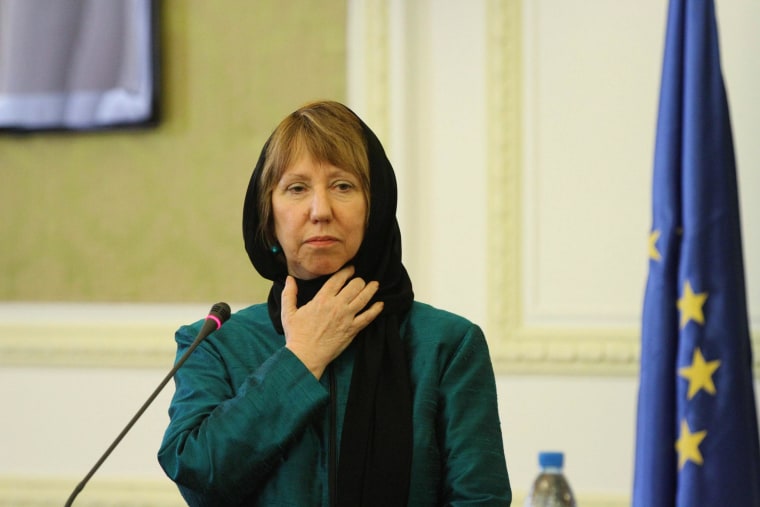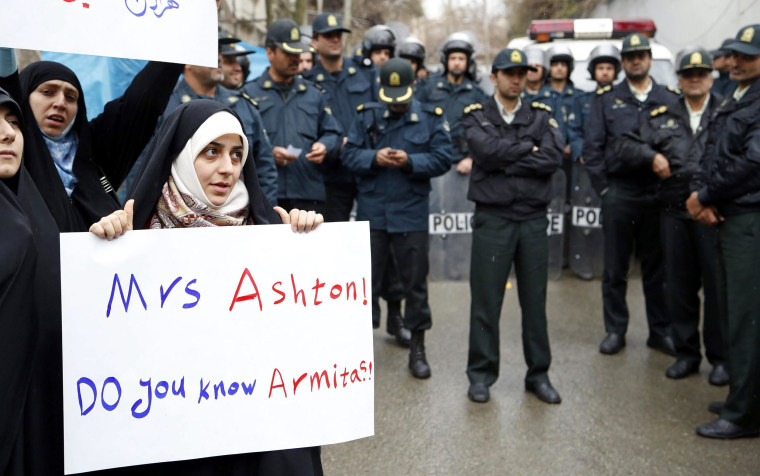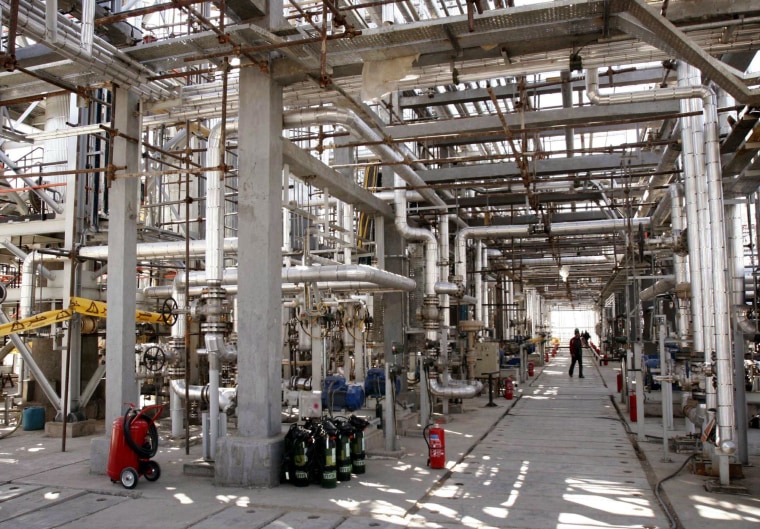VIENNA -- The latest round of Iran nuclear negotiations closed with an unprecedented outbreak of cordiality.
Catherine Ashton, the chief negotiator for world powers trying to make sure Iran does not develop nuclear weapons, wished her Iranian counterparts “Happy Nowruz,” or New Year, in Persian.
Iran’s Foreign Minister Javad Zarif, meanwhile, said he was “optimistic” that a July deadline for a deal could be reached.
"Elsewhere in the world the U.S. is trying to manage one crisis after another. Iran is Obama’s best opportunity for a major foreign policy victory"
Wednesday's upbeat statements, which were accompanied by the now-regular smiles and jokes between Zarif and Ashton, are the latest indication of how desperate both sides are to resolve a dispute that in recent years has threatened to trigger a new war in the Middle East.
U.S. could use a diplomatic victory
An agreement with Iran over its nuclear program, which Tehran insists is peaceful but the West fears could be aimed at developing nuclear weapons, would be rare good news for the United States.
“Elsewhere in the world the U.S. is trying to manage one crisis after another. Iran is [President Barack] Obama’s best opportunity for a major foreign policy victory,” said Karim Sadjadpour, a researcher on Iran at the Carnegie Endowment for International Peace.
Even the fact that talks are continuing can be seen as a success against a backdrop of seemingly intractable challenges facing the U.S. and its allies.

Russia has annexed part of Ukraine, the Israelis and Palestinians have not agreed to an American-backed peace plan, and Afghanistan’s president refuses to sign a key security agreement with the U.S.
Meanwhile in Syria, a war rages even after Obama set “a red line” on the issue of chemical weapons for President Bashar Assad, and then did not act when evidence emerged that forces loyal to the Syrian leader had gassed civilians.
Iran wants a deal, too
Iran also really needs a deal, or the end of international economic sanctions crippling its economy and making life almost unbearable for regular Iranians. Inflation is running at close to 50 percent, sending the price of basic necessities like bread and soap skyrocketing, and raising the prospect of paralyzing popular unrest.
A recent sign of Tehran’s commitment to talks came when senior lawmaker Abbas Ali Mansouri urged “all political parties to avoid making remarks which might weaken the negotiating team,” according to the state-run IRNA news service.
Meanwhile, the usually constant drumbeat of anti-Western proclamations from Iranian hardliners has been more muted recently.
“A nuclear Iran, and America trying to go war with it ... would be beyond disruptive, a regional war so big that it is irresponsible even to contemplate it”
And earlier this month, a spat that in the past would have derailed talks ended up being a bump in the road. During an unprecedented visit to Tehran earlier in March, Ashton infuriated the government by meeting rights activists and mothers of protesters killed during 2009 demonstrations.
The foreign ministry reprimanded Ashton’s “unsanctioned” visit, and a traditional dinner between her and Zarif on the eve of the negotiations was canceled. But while the last team of negotiators may have allowed this kind of diplomatic scuffle to torpedo talks, this time they didn't.

Key for the Iranian team is that Supreme Leader Ayatollah Ali Khamenei's backs the talks, something neither of his predecessors enjoyed.
“The game changer from where I sit is that [President Hassan] Rouhani seems to enjoy support of the supreme leader,” said Eugene Rogan, professor of modern Middle Eastern history at Oxford University and author of "The Arabs: A History."
“It makes me think that there may really be a chance here, that there is something in this and we should be pursuing this with everything within our means.”
The “terrible” alternative would be “a nuclear Iran, and America trying to go war with it,” Rogan said. “It would be beyond disruptive, a regional war so big that it is irresponsible even to contemplate it.”
Still long way to go
Both sides might want a deal, but major sticking points remain.
Negotiators haven't agreed on how much uranium Iran should enrich and keep. Or whether Tehran will close the heavy-water reactor near Arak, which the West sees as a possible source of plutonium for bombs.

Indeed, Russia said both sides were still "far apart" on the issue of uranium enrichment, Interfax news agency quoted Deputy Foreign Minister Sergei Ryabkov as saying after the latest round of talks ended in Vienna this week.
Iran had "very far-reaching demands" on enrichment, Ryabkov added.
Mark Fitzpatrick, who heads up the non-proliferation and disarmament program at the London-based International Institute for Strategic Studies, agreed that huge obstacles remain and gave talks only a 10 percent chance of success.
So while there was a lot of pressure on Obama to complete a deal, an agreement is far from a foregone conclusion.
“Some might say that given all the other troubles that Obama is now faced with, it sure would be nice to have a political victory on Iran. And that victory appears to be in sight, so there may be all the more interest in getting a deal,” said Fitzpatrick, who is a former American diplomat.
“I don’t think for a moment that the Obama administration would cut corners and give up more to get a deal," he added. "I think they will hold pretty firm on the red lines on what is required."
Pegah Parsafar of NBC News and Reuters contributed to this report. F. Brinley Bruton reported from London.